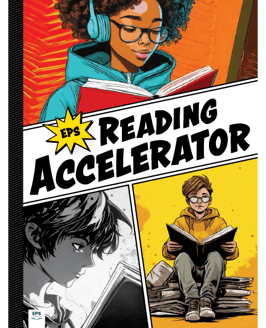Those who work with middle school students understand the increased academic expectations and responsibilities middle schoolers face, making this period crucial for literacy development. In recent years, middle school literacy achievement has gained a growing amount of attention that has been amplified by declining literacy scores.
Strong literacy skills are essential for reading and comprehending complex texts, meeting the writing demands of the curriculum across subjects, and participating fully in class discussions and collaborative projects. Without reading proficiency, students must work hard to decode, learn new academic vocabulary, and retain information from texts in all subjects, including science, social studies, and math. Effective literacy interventions and adequate teacher support are vital to ensure students develop the foundational and advanced literacy skills necessary for academic success and lifelong learning.
Contributing Factors to Low Literacy Achievement in Middle School
National Assessment of Educational Progress (NAEP) scores indicate a worrying trend in literacy. In 2022, only 33% of eighth graders scored at or above proficient in reading, a decline from 2019 data. Many states report similar declines in their own standardized test scores. For instance, California's Smarter Balanced Assessment showed that only 45% of middle school students met or exceeded the reading standards in 2023.
Middle school literacy achievement faces several significant challenges. For many of today’s striving middle school students, comprehension problems often stem from insufficient decoding skills. Current research shows that students with stagnant growth in their reading comprehension levels often have underlying deficits in decoding skills.
Furthermore, the research indicates that the comprehension levels of these students are unlikely to increase until their decoding skill gaps are remediated. (Wang, et. al., 2019). In other words, striving middle school students with limited decoding skills do not fully benefit from comprehension-focused instruction or intervention. In fact, many striving middle school readers need to focus on improving decoding skills before they can improve comprehension and achieve reading proficiency. Effective literacy intervention at the foundational level must be explicit, systematic, sequential, and cumulative, addressing multiple reading components and including ample practice.
Striving middle school students with stagnant comprehension levels often have underlying decoding weaknesses that need remediation before comprehension can improve (Wang et al., 2019).
How to Support Middle School Readers and Cultivate a Love for Reading
- Build a Culture of Literacy: Middle school administrators and teachers can motivate middle school students to improve their reading skills and enhance literacy by building a culture of literacy.
- Utilize engaging activities, diverse reading materials, supportive learning environments, and targeted Tier 2 interventions.
- Dedicate time in the schedule for reading instruction or intervention to address specific skill gaps and accelerate growth.
- Provide teachers with age-appropriate resources and training in science of reading-based interventions to support a wide range of striving readers, including those with comprehension challenges due to foundational skill gaps.
- Address the Needs of ELL Students: Administrators must address the needs of English Language Learners (ELLs), students with dyslexia, and students with other learning differences, while supporting proficiency for all students.
- Set specific objectives and goals to help all students attain grade-level reading skills.
- Focus resources on supporting striving readers and disadvantaged students and build sustainable literacy practices that integrate seamlessly into the curriculum for long-term success.
- Implement assessment systems, provide ongoing feedback, and enable timely interventions to help educators monitor progress, identify areas of need, and adjust instruction accordingly.
- Differentiate Lessons through AI Effectiveness: Artificial intelligence (AI) offers promising solutions for personalized learning experiences tailored to each middle school student's needs. To maximize AI's effectiveness in literacy support, middle school teachers must be trained to use AI platforms effectively.
- Focus professional development on familiarizing educators with AI tools and demonstrating how these technologies can enhance literacy instruction.
- Set up pilot programs to monitor the impact of AI tools so middle schools can evaluate their effectiveness in real classroom settings, gather valuable insights, and make informed decisions about broader implementation.
- Use continuous performance data collection, review, and analysis to refine approaches and adjust strategies, helping ensure that AI tools provide optimal support for students' literacy development.
- Choose Powerful Solutions: Look for a literacy program that provides a swift path to closing foundational skill gaps for Tier 2 striving middle school readers.
- Choose one that builds phonemic awareness, phonics, decoding, and fluency skills, and supports vocabulary and comprehension.
- Ideally, district administrators should select a program that can successfully be delivered in one school year or less, in whole-class or small-group settings.
Decoding skills are typically not assessed beyond third grade, and available materials are often designed for younger students or those needing intensive intervention.
Prioritizing Literacy Initiatives for Academic Success
Literacy initiatives should be prioritized during back-to-school activities to help all middle school students develop and improve essential reading skills, including foundational reading skills such as phonics and decoding. Effort focused on reading proficiency from the beginning of the school year builds a solid foundation for academic success. By implementing comprehensive reading support programs, schools and districts can help students get ahead and stay ahead this year and in years to come. Include teacher training and the integration of innovative tools and tech powered by AI within a supportive middle school learning environment. Improving reading proficiency enhances overall academic performance, empowering middle school students to excel in all subjects and paving the way for future growth and accomplishment.
Accelerate middle-school students' journey toward reading proficiency by closing gaps in foundational reading skills in a year or less with a program like EPS Reading Accelerator!
|
 EPS Reading Accelerator's Comprehensive Approach:
EPS Reading Accelerator's Comprehensive Approach: